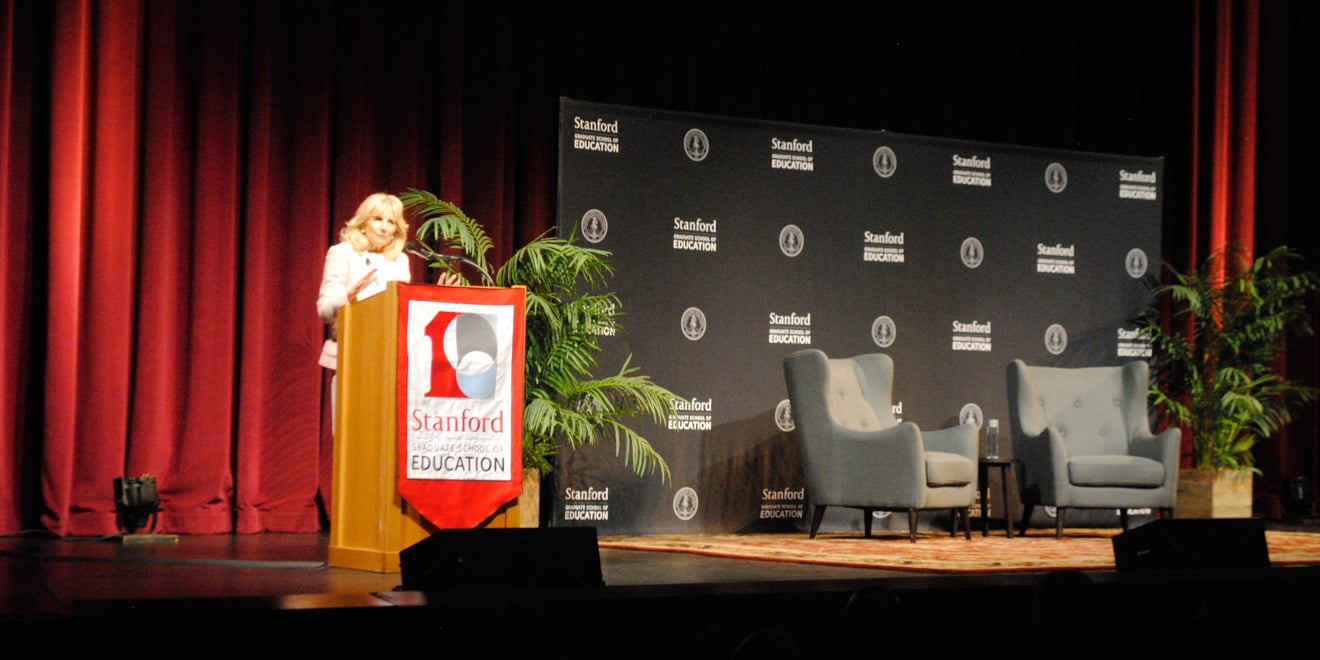On Wednesday night, professor and former Second Lady Dr. Jill Biden spoke on campus for the Graduate School of Education’s Centennial Year Cubberley Lecture. Her talk, punctuated by humor, focused on the need for educators to consider students’ circumstances outside of the classroom to improve their work within it.
Her sold-out presentation, held in Memorial Auditorium, touched on her lifelong career as a teacher and her thoughts on Stanford’s role in tackling the country’s educational challenges. Following her talk, Biden sat down for a Q&A moderated by Jim Shelton, former Department of Education Deputy Secretary.
Throughout the evening, Biden discussed her career as a teacher, which began in public high schools and continued to Delaware Technical & Community College and then to Northern Virginia Community College, where she still works. She emphasized that teaching has been one of her top priorities, even after becoming Second Lady of the United States.
“Back in 2008, after we’d won the election, no one really expected me to keep teaching,” she said. “But I couldn’t just walk away…So I did both. For eight years, that was my life’s dichotomy. State receptions—and midterms. Dinner with the most powerful man on earth—and study sessions with single moms.”
Indeed, Biden said that some of her students were not even aware of her role in government. She told one story about a student who came to see her for a grade conference.
“This woman comes in,” said Biden. “And she goes, ‘Dr. B, I saw you last night on the television with Michelle Obama! And I said, ‘Mom, come here, that’s my English teacher!’’ And her mom goes, ‘That’s not your English teacher, that’s the Second Lady.’”
Biden cited her own experience when she suggested education must consider not only traditionally academic subjects, but also students’ holistic well-being. She enumerated the many challenges her own students face, including domestic violence and suicide attempts.
Biden also cited the statistic that 30 percent of community college students are food insecure, and some teachers pay out-of-pocket to support them. Biden herself said that she provides books and breakfast bars for her students in need. While she does not mind doing this, she does not want it to stand as a responsibility other educators have to bear to support their students.
Instead, Biden illustrated how larger institutions, like schools, could begin to help students tackle their personal challenges. She praised one school she had visited which provided medical, dental and mental health services on campus. The school even had resources for its numerous homeless students.
“They had a shower,” said Biden, “And then they had racks of clothes for those kids who had been sleeping in a car, who could come in before school, get a shower and pick something off the rack, something new to wear.”
Some audience members said they wished they had heard a more thorough explanation of how under-resourced schools could tackle these kinds of challenges.
“It was wonderful to hear Dr. Biden express her enthusiasm for teaching and education,” said audience member Madeline Musante ’18. “However, I would have liked to see a more in-depth discussion of policy implementation. My mother is an elementary school teacher in a very low-income school district. She and her staff would love to have resources for homeless students like on-site showers, but there is simply not the money right now, and we need to look at how to change that.”
Though Biden did not discuss specific policies addressing these issues, she did agree that lack of resources is an ongoing challenge in education. She also touched on Stanford’s role in improving education throughout the United States. She praised programs like the Policy, Organization and Leadership Studies Master’s Program, which teaches students how to become leaders in reshaping the field of education.
However, she also indicated that Stanford has room to grow in terms of its reciprocity agreement, which allows students who graduate community colleges to enroll as juniors.
“Your President, here at Stanford—Marc. He said, ‘What can we do?’ And I said, ‘How many [reciprocity] students do you have?’ ‘Oh, we get about 60 every year.’ ‘Sixty!? Come on! Raise the number.’”
Biden also celebrated the teachers in the room, who, at one point, raised their hands so she could see who they were. She drew from her experience when sharing wisdom with aspiring educators.
“[To] the young people trying to be teachers, I’m telling you, in the School’s of Education, they’re not going to really and truly prepare you for everything you’re going to encounter in your classroom.”
Members of the audience chuckled, recalling that the talk was being hosted by the Graduate School of Education.
“They’re not,” Biden said. “I mean, I deal with so many problems on a personal basis with my students and I think to myself, ‘Nobody ever trained me to do this.’ They taught me how to teach literature and teach writing, but [there are] all these social skills that you need.”
She added that changing technology has made her apply those interpersonal skills in new ways.
“I mean, my students are texting me all the time. It could be 10 o’clock at night, ‘Hey Dr. B., can you check my thesis statement?’ You know, I’m in bed! But the expectations are so much different now. Teaching is not a job. It’s a lifestyle. It permeates your whole life.”
Contact Mini Racker at mracker ‘at’ stanford.edu.
